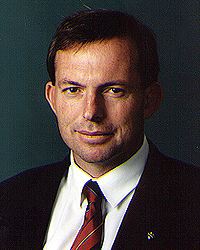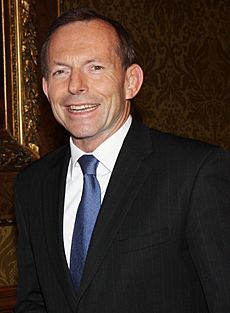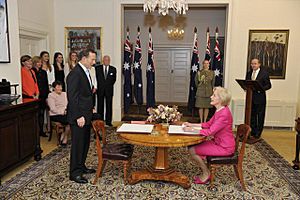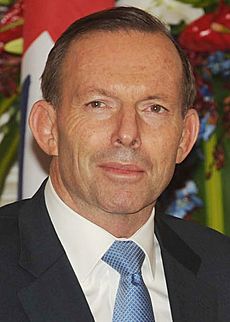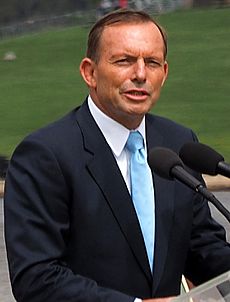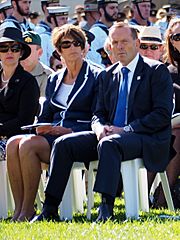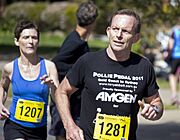Tony Abbott facts for kids
Quick facts for kids
Tony Abbott
|
|||||||||||||||||||||||||||||||||||||||||||||||||||
|---|---|---|---|---|---|---|---|---|---|---|---|---|---|---|---|---|---|---|---|---|---|---|---|---|---|---|---|---|---|---|---|---|---|---|---|---|---|---|---|---|---|---|---|---|---|---|---|---|---|---|---|
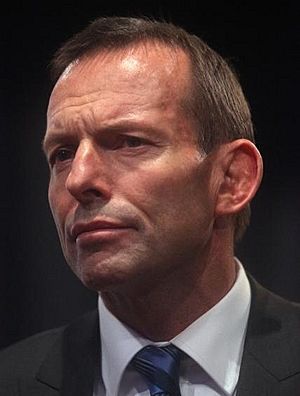
Abbott in 2010
|
|||||||||||||||||||||||||||||||||||||||||||||||||||
| 28th Prime Minister of Australia | |||||||||||||||||||||||||||||||||||||||||||||||||||
| In office 18 September 2013 – 15 September 2015 |
|||||||||||||||||||||||||||||||||||||||||||||||||||
| Monarch | Elizabeth II | ||||||||||||||||||||||||||||||||||||||||||||||||||
| Governor General | |||||||||||||||||||||||||||||||||||||||||||||||||||
| Deputy | Warren Truss | ||||||||||||||||||||||||||||||||||||||||||||||||||
| Preceded by | Kevin Rudd | ||||||||||||||||||||||||||||||||||||||||||||||||||
| Succeeded by | Malcolm Turnbull | ||||||||||||||||||||||||||||||||||||||||||||||||||
| Leader of the Opposition | |||||||||||||||||||||||||||||||||||||||||||||||||||
| In office 1 December 2009 – 18 September 2013 |
|||||||||||||||||||||||||||||||||||||||||||||||||||
| Prime Minister | Kevin Rudd Julia Gillard |
||||||||||||||||||||||||||||||||||||||||||||||||||
| Deputy | Julie Bishop | ||||||||||||||||||||||||||||||||||||||||||||||||||
| Preceded by | Malcolm Turnbull | ||||||||||||||||||||||||||||||||||||||||||||||||||
| Succeeded by | Chris Bowen | ||||||||||||||||||||||||||||||||||||||||||||||||||
| Leader of the Liberal Party | |||||||||||||||||||||||||||||||||||||||||||||||||||
| In office 1 December 2009 – 14 September 2015 |
|||||||||||||||||||||||||||||||||||||||||||||||||||
| Deputy | Julie Bishop | ||||||||||||||||||||||||||||||||||||||||||||||||||
| Preceded by | Malcolm Turnbull | ||||||||||||||||||||||||||||||||||||||||||||||||||
| Succeeded by | Malcolm Turnbull | ||||||||||||||||||||||||||||||||||||||||||||||||||
| Leader of the House | |||||||||||||||||||||||||||||||||||||||||||||||||||
| In office 12 February 2002 – 3 December 2007 |
|||||||||||||||||||||||||||||||||||||||||||||||||||
| Prime Minister | John Howard | ||||||||||||||||||||||||||||||||||||||||||||||||||
| Preceded by | Peter Reith | ||||||||||||||||||||||||||||||||||||||||||||||||||
| Succeeded by | Anthony Albanese | ||||||||||||||||||||||||||||||||||||||||||||||||||
|
|||||||||||||||||||||||||||||||||||||||||||||||||||
| Member of the Australian Parliament for Warringah |
|||||||||||||||||||||||||||||||||||||||||||||||||||
| In office 26 March 1994 – 18 May 2019 |
|||||||||||||||||||||||||||||||||||||||||||||||||||
| Preceded by | Michael MacKellar | ||||||||||||||||||||||||||||||||||||||||||||||||||
| Succeeded by | Zali Steggall | ||||||||||||||||||||||||||||||||||||||||||||||||||
| Director of the Australians for Constitutional Monarchy Group | |||||||||||||||||||||||||||||||||||||||||||||||||||
| In office 4 June 1992 – 18 February 1994 |
|||||||||||||||||||||||||||||||||||||||||||||||||||
| Preceded by | organisation established | ||||||||||||||||||||||||||||||||||||||||||||||||||
| Succeeded by | Kerry Jones | ||||||||||||||||||||||||||||||||||||||||||||||||||
| Personal details | |||||||||||||||||||||||||||||||||||||||||||||||||||
| Born |
Anthony John Abbott
4 November 1957 Lambeth, London, England |
||||||||||||||||||||||||||||||||||||||||||||||||||
| Citizenship | Australian British (until 1993) |
||||||||||||||||||||||||||||||||||||||||||||||||||
| Political party | Liberal | ||||||||||||||||||||||||||||||||||||||||||||||||||
| Other political affiliations |
Democratic Labor (1979) | ||||||||||||||||||||||||||||||||||||||||||||||||||
| Spouse |
Margie Aitken
(m. 1988) |
||||||||||||||||||||||||||||||||||||||||||||||||||
| Children | 3 | ||||||||||||||||||||||||||||||||||||||||||||||||||
| Education | St Aloysius' College Saint Ignatius' College |
||||||||||||||||||||||||||||||||||||||||||||||||||
| Alma mater |
|
||||||||||||||||||||||||||||||||||||||||||||||||||
| Profession |
|
||||||||||||||||||||||||||||||||||||||||||||||||||
| Signature | |||||||||||||||||||||||||||||||||||||||||||||||||||
Anthony John Abbott (born 4 November 1957) is an Australian former politician. He was the 28th prime minister of Australia from 2013 to 2015. He was also the leader of the Liberal Party of Australia. Abbott served as a member of parliament (MP) for the area of Warringah in New South Wales from 1994 to 2019.
Abbott was born in London, England. His mother was Australian, and his father was British. He moved to Sydney, Australia, when he was two years old. He studied economics and law at the University of Sydney. Later, he went to The Queen's College, Oxford, in England, as a Rhodes Scholar. He studied Philosophy, Politics, and Economics there. After university, Abbott worked as a journalist and a political adviser.
In 1992, he became the director of Australians for Constitutional Monarchy. This group supported Australia keeping the British monarch as its head of state. He held this job until he was elected to parliament in 1994. He became the MP for Warringah.
After the 1998 election, Abbott became a government minister. He was the Minister for Employment Services. In 2001, he joined the Cabinet as Minister for Employment, Workplace Relations and Small Business. From 2003 to 2007, he was the Minister for Health and Ageing.
In 2009, Abbott became the leader of the Liberal Party. This also made him the Leader of the Opposition. He led the Liberal-National Coalition to victory in the 2013 election. He then became Prime Minister.
As Prime Minister, Abbott introduced new policies. These included stopping boats carrying asylum seekers. He also removed some taxes, like the Minerals Resource Rent Tax. His government worked to reduce the national budget deficit. He also started the Medical Research Future Fund to support health research. In international affairs, he signed trade agreements with China, Japan, and South Korea. He also sent Australian forces to fight against ISIS.
Abbott's budget plans were not very popular. In September 2015, he was replaced as Prime Minister by Malcolm Turnbull. He stayed in Parliament as a regular MP until 2019. He lost his seat of Warringah to an independent candidate, Zali Steggall. In 2020, he became an adviser to the British government's Board of Trade.
Contents
Early Life and Education
Birth and Family
Tony Abbott was born on 4 November 1957 in London, England. He was the oldest of four children. His mother, Fay, was born in Sydney, Australia. His father, Richard, was born in England.
In 1940, during World War II, his father, Dick Abbott, came to Australia. He joined the Royal Australian Air Force. In 1954, Dick returned to the UK. There, he met and married Fay Peters.
Childhood and School Days
On 7 September 1960, Tony, his parents, and his younger sister Jane moved from the UK to Australia. They traveled on a ship called the SS Oronsay. The family settled in Sydney. They lived in Bronte and later in Chatswood. Tony's father became a successful orthodontist.
Abbott went to primary school at St Aloysius' College (Sydney). He finished high school at Saint Ignatius' College, Riverview. Both were Jesuit schools. He then studied at the University of Sydney. He earned degrees in Economics and Law. He was also president of the Student Representative Council.
Later, he went to The Queen's College, Oxford, in England. He was a Rhodes Scholar. He earned a Master of Arts degree.
During his university years, Abbott was known for his strong political views. He was a student boxer at Oxford. He also helped rescue people twice. Once, he saved a child from the sea. Another time, he helped rescue children from a burning house. He left without waiting for thanks both times.
Before Politics
After his time in Britain, Abbott returned to Australia. For a short period, he considered becoming a priest. He entered St Patrick's Seminary in 1984 but left in 1987. He realized it wasn't the right path for him.
Abbott then worked as a journalist. He wrote for newspapers and magazines like The Australian. He also briefly managed a concrete plant.
He was born a British citizen because his father was British. He became an Australian citizen in 1981. In 1993, he gave up his British citizenship. This was required to run for parliament in Australia.
Becoming a Politician
Starting in Public Life
Abbott began his public career as a journalist. He worked for The Bulletin and The Australian. He became friends with some senior figures in the Labor Party. They encouraged him to join Labor. However, Abbott felt the Labor Party was not for him.
He then worked for John Hewson, who was the leader of the Liberal Party. Abbott helped develop the "Fightback!" policy.
In 1993, Abbott became the Executive Director of Australians for Constitutional Monarchy (ACM). This group wanted Australia to keep the British monarch as its head of state. His work with ACM helped him build a strong relationship with John Howard. Howard later became Prime Minister.
Member of Parliament (1994–2009)
Abbott was chosen by the Liberal Party to run for the federal seat of Division of Warringah in 1994. He won the election easily. Warringah was a safe Liberal seat. He continued to win the seat in every election until 2019.
He held several important roles in government. He was a parliamentary secretary from 1996 to 1998. Then he became a minister. He was Minister for Employment Services (1998–2001). He also served as Minister for Employment and Workplace Relations and Small Business (2001). From 2003 to 2007, he was the Minister for Health and Ageing. He was also the Leader of the House from 2002 to 2007.
As a minister, Abbott helped start programs like Green Corps. This program involved young people in environmental work. He also oversaw the Job Network and the Work for the Dole scheme. These programs helped people find jobs.
In 1999, Australia held a vote on becoming a republic. Abbott was a strong supporter of keeping the monarchy. He campaigned for the "No" vote, which won.
Cabinet Minister (1998–2007)
When Abbott became a Cabinet minister in 1998, Prime Minister Howard praised his effectiveness. In 2003, Abbott became Minister for Health. He worked to fix problems with Medicare and medical insurance.
He also started health programs like the Nurse Family Partnership. This program aimed to help Indigenous youth. In 2005, he helped Australians injured in the Bali bombings. He arranged for them to be flown to Singapore for medical care.
Abbott introduced the Medicare Safety Net. This program put a cap on how much people had to pay for medical costs each year.
Shadow Minister (2007–2009)
The Liberal Party lost the 2007 election. Abbott was re-elected to his seat. He became a shadow minister for Families, Community Services, and Indigenous Affairs. He spent time teaching in remote Aboriginal communities. He also supported continuing a program that helped Aboriginal communities.
During this time, Abbott wrote a book called Battlelines. It was about the Howard Government and ideas for the Liberal Party's future.
Abbott also spoke out about unauthorized immigrant arrivals by boat. He said the number of arrivals increased because the government changed border protection laws.
In November 2009, Abbott resigned from his shadow minister role. This was due to disagreements within the Liberal Party about a proposed Emissions Trading Scheme (ETS).
Leader of the Opposition (2009–2013)
On 1 December 2009, Tony Abbott was elected leader of the Liberal Party. He became the Leader of the Opposition. He opposed the government's ETS plan. He called it a "Great big tax on everything." The plan was rejected by the Senate.
Abbott announced a new plan to reduce carbon emissions. It focused on giving money to industries and farmers to reduce emissions.
As Opposition Leader, Abbott's Catholic faith was often discussed by the media. He said he was frustrated by the focus on his religion.
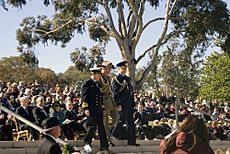
In March 2010, Abbott announced a new policy for paid parental leave. This would be funded by a tax increase on large companies.
He continued to work with Noel Pearson, a prominent Indigenous activist. Abbott supported Pearson's efforts to help Indigenous communities develop their land.
Abbott is also very active. He completed an Ironman Triathlon in 2010. He also takes part in the annual "Pollie Pedal" charity bike ride. This ride raises money for good causes and allows him to visit small towns.
2010 Federal Election
In June 2010, Julia Gillard became Prime Minister. She called a federal election for 21 August. Early polls suggested Labor would win easily.
Abbott and Gillard had one official debate. Surveys suggested Gillard won. However, Abbott was seen as winning other public discussions.
The election result was very close. Both Labor and the Coalition won 72 seats. This meant neither had enough seats to form a majority government. This was the first hung parliament since 1940.
Abbott and Gillard then negotiated with independent members of parliament. In the end, Gillard formed a minority government with the support of some independents and the Greens.
After the 2010 Election
After the 2010 election, Abbott remained the leader of the Liberal Party. He appointed Malcolm Turnbull as the Communications spokesman.
Abbott opposed the government's plan to introduce a "flood levy" after the 2010–2011 Queensland floods. He believed the money should come from the existing budget. He also suggested building more dams to help with floods and food security.
In February 2011, Abbott criticized the government's health reforms. He also strongly opposed Prime Minister Gillard's plan for a "carbon tax." He said Gillard had promised not to introduce such a tax before the election.
In April 2011, Abbott proposed a plan to help Indigenous people in the Northern Territory. He wanted to improve school attendance and police numbers. He also announced a plan to help people with mental health problems find jobs.
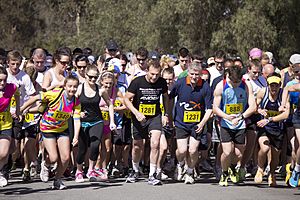
In June 2011, Abbott's popularity as preferred Prime Minister rose. In September 2011, he announced a plan to develop agriculture in northern Australia. This would involve building dams for irrigation and power.
In January 2012, Abbott outlined his plans if he became Prime Minister. He promised to spend one week each year in an Indigenous community. He also aimed to cut government spending and taxes.
In November 2012, Abbott released his fourth book, A Strong Australia. It was a collection of his important speeches.
Prime Minister (2013–2015)
Taking Office
At the federal election on 7 September 2013, Abbott led the Liberal-National coalition to victory. He and his team were sworn in on 18 September 2013.
One of his first actions was to introduce a law to remove the Carbon Tax. He also started "Operation Sovereign Borders" to stop boats carrying asylum seekers. This policy was very popular with the public.
As Prime Minister, Abbott signed important free trade agreements. These were with Japan, South Korea, and China.
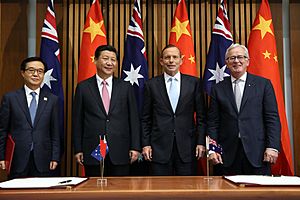
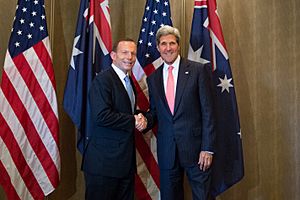
Key Policies and Challenges
The Carbon Tax was officially removed in July 2014. The Mining Tax was also removed in September 2014.
The government's first budget in 2014 was criticized. Many of its spending cuts were blocked by other parties in the Senate.
In March 2014, Abbott brought back the titles of Knight and Dame to the Order of Australia. This decision was criticized by some, especially when Prince Philip, Duke of Edinburgh, was given the title in 2015. The titles were later removed again by the next Prime Minister.
Leadership Challenges
In February 2015, some Liberal MPs tried to challenge Abbott's leadership. The vote was held, and Abbott won. He described it as a "near death experience." He promised to consult his colleagues more.
In July 2015, the Speaker of the House, Bronwyn Bishop, faced criticism for her use of taxpayer money. Abbott was criticized for how he handled the situation. Bishop eventually resigned.
During his time as Prime Minister, there was a growing debate about same-sex marriage. Abbott personally did not support changing the law. He decided that the issue should be decided by a national vote (a plebiscite) after the next election.
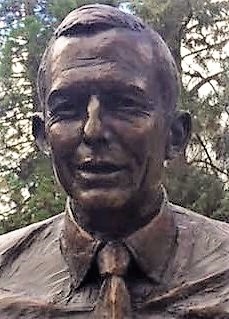
On 14 September 2015, Malcolm Turnbull challenged Abbott for the Liberal Party leadership. Abbott was defeated in the vote. Turnbull became the new Prime Minister. Critics said Abbott was removed due to low public opinion and some political mistakes.
After Being Prime Minister (2015–2019)
After losing the leadership, Abbott returned to being a regular Member of Parliament. He promised not to cause problems for the new government. He said he would not "wreck, undermine, or snipe."
He continued to speak out on various issues. He defended his government's past decisions. He also continued his commitment to spending a week each year in Indigenous communities.
In 2017, there was a national postal survey on same-sex marriage. Abbott campaigned against changing the law. After the "yes" vote won, he accepted the result.
In 2018, Malcolm Turnbull resigned as Prime Minister. Abbott supported Peter Dutton in the leadership vote. Scott Morrison became the new leader. Abbott said the party would be more united under Morrison.
Abbott was appointed as Prime Minister Scott Morrison's Special Envoy on Indigenous Affairs. He focused on improving school attendance and performance in Indigenous communities.
In the 2019 federal election, Abbott lost his seat of Warringah. He was defeated by an independent candidate, Zali Steggall. This was the first time the Liberal Party had lost the seat since 1922. Abbott had served as the MP for Warringah for 25 years.
Post-Parliamentary Career
After leaving parliament, Abbott joined the board of the Ramsay Centre for Western Civilisation in 2016. In 2019, he was appointed to the board of the Australian War Memorial.
In September 2020, Abbott became an adviser to the UK's Board of Trade. His role is to advise on international trade deals for the UK.
In February 2023, Abbott joined the board of the UK think-tank Global Warming Policy Foundation. In November 2023, he was appointed to a board seat at Fox Corporation.
Political Views
Abbott is known for his conservative political views.
Aboriginal Affairs
Abbott has a strong interest in Indigenous affairs. As Opposition Leader and Prime Minister, he made Indigenous affairs a priority. He worked with Indigenous leader Noel Pearson. He also volunteered as a teacher in remote Indigenous communities. He promised to spend one week a year in these communities.
Constitutional Monarchy
Abbott supports Australia keeping the British monarch as its head of state. Before becoming an MP, he led the group Australians for Constitutional Monarchy.
Climate Change
Abbott has expressed some doubts about the science of climate change. He opposed a carbon tax or an Emissions Trading Scheme (ETS). He believed these would harm the economy. Instead, he proposed other ways to reduce emissions, like financial incentives for industries.
In 2017, he said that climate change might be "doing good" and helping plants grow. In 2019, he claimed the world was "in the grip of a climate cult."
Social Policy
Abbott opposed the legalisation of same-sex marriage in Australia. He also opposed some types of stem cell research.
When the Australian Capital Territory tried to allow same-sex marriage, Abbott's government challenged it in the High Court. The High Court ruled that the territory's law clashed with federal law. Eventually, same-sex marriage became legal in Australia in 2017.
National Broadband Network
Abbott was against the government's plan for a very expensive National Broadband Network (NBN). He called it a "white elephant." He argued that Australia could not afford it.
His party proposed a different NBN plan. It would use a mix of technologies to provide internet access. They promised faster internet speeds for Australians.
China
Abbott supported the AUKUS defense agreement between Australia, the United States, and the United Kingdom. This agreement aims to counter China's growing power. Abbott said it would make Australia safer.
Personal Life
Tony Abbott is married to Margaret "Margie" Aitken. They married in 1988. They have three daughters: Louise, Bridget, and Frances. They became grandparents in 2021.
Abbott is a Roman Catholic. He briefly trained to be a priest. He has often been asked about his religious beliefs and their role in politics.
Community Service
Abbott is an active volunteer. He is a member of the New South Wales Rural Fire Service. He is also a volunteer with the Queenscliff Surf Life Saving Club.
He participates in the "Pollie Pedal," a yearly charity bike ride. This ride raises money for causes like breast cancer research.
Abbott has spent time teaching in remote Aboriginal communities in Cape York. He taught reading to children. He also worked with groups helping families manage their money. He did this to learn more about Indigenous issues.
Writings
Abbott has written four books:
- The Minimal Monarchy
- How to Win the Constitutional War
- Battlelines (2009) – a biography and reflections on politics.
- A Strong Australia (2012) – a collection of his speeches.
Honours
National Honours
 8 June 2020 Companion of the Order of Australia (AC): For his important service to Australia as Prime Minister, and for his work in trade, border control, and with Indigenous communities.
8 June 2020 Companion of the Order of Australia (AC): For his important service to Australia as Prime Minister, and for his work in trade, border control, and with Indigenous communities. 4 November 2018 National Medal (Australia): For 15 years of service as a volunteer firefighter.
4 November 2018 National Medal (Australia): For 15 years of service as a volunteer firefighter. 1 January 2001 Centenary Medal: For his service as Minister for Employment and Workplace Relations.
1 January 2001 Centenary Medal: For his service as Minister for Employment and Workplace Relations.
State Medals
 New South Wales: 8 March 2015 Rural Fire Service Long Service Medal: For ten years of volunteer service.
New South Wales: 8 March 2015 Rural Fire Service Long Service Medal: For ten years of volunteer service.
Foreign Medals
 Japan: 29 April 2022 Grand Cordon of the Order of the Rising Sun
Japan: 29 April 2022 Grand Cordon of the Order of the Rising Sun
Images for kids
See also
 In Spanish: Tony Abbott para niños
In Spanish: Tony Abbott para niños
- Abbott government
- 2014 Australian federal budget
- 2015 Australian federal budget
 | James Van Der Zee |
 | Alma Thomas |
 | Ellis Wilson |
 | Margaret Taylor-Burroughs |


